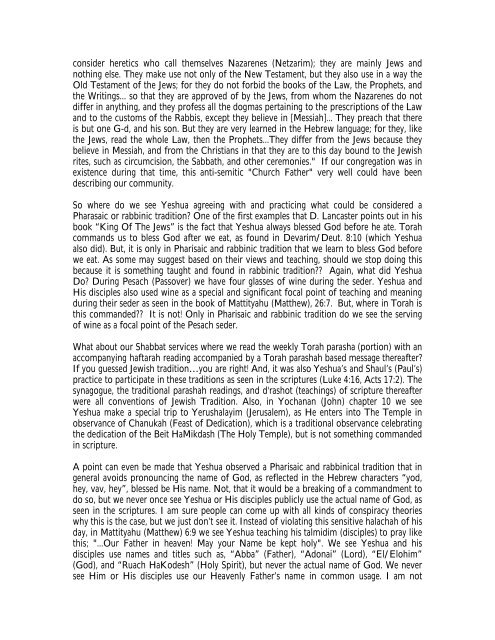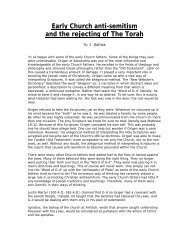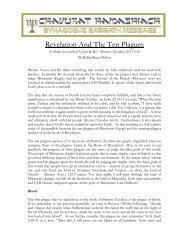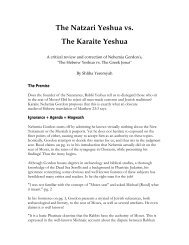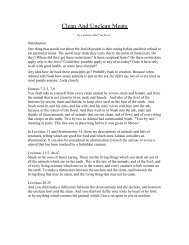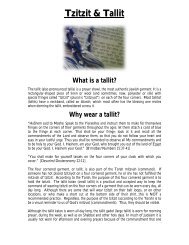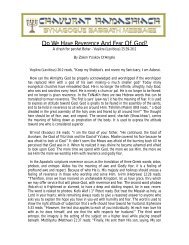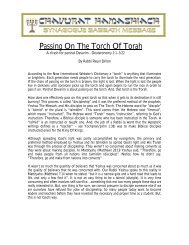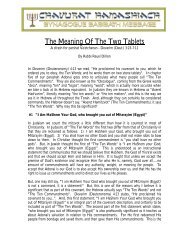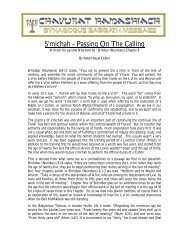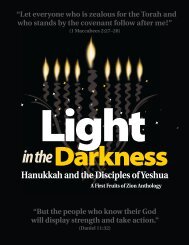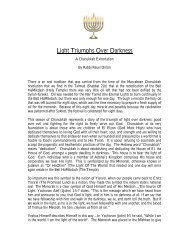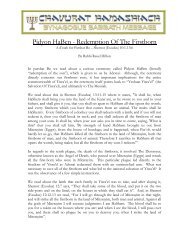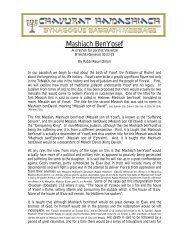Clinging To The Words Of The King
Clinging To The Words Of The King
Clinging To The Words Of The King
Create successful ePaper yourself
Turn your PDF publications into a flip-book with our unique Google optimized e-Paper software.
consider heretics who call themselves Nazarenes (Netzarim); they are mainly Jews and<br />
nothing else. <strong>The</strong>y make use not only of the New Testament, but they also use in a way the<br />
Old Testament of the Jews; for they do not forbid the books of the Law, the Prophets, and<br />
the Writings... so that they are approved of by the Jews, from whom the Nazarenes do not<br />
differ in anything, and they profess all the dogmas pertaining to the prescriptions of the Law<br />
and to the customs of the Rabbis, except they believe in [Messiah]... <strong>The</strong>y preach that there<br />
is but one G-d, and his son. But they are very learned in the Hebrew language; for they, like<br />
the Jews, read the whole Law, then the Prophets...<strong>The</strong>y differ from the Jews because they<br />
believe in Messiah, and from the Christians in that they are to this day bound to the Jewish<br />
rites, such as circumcision, the Sabbath, and other ceremonies." If our congregation was in<br />
existence during that time, this anti-semitic "Church Father" very well could have been<br />
describing our community.<br />
So where do we see Yeshua agreeing with and practicing what could be considered a<br />
Pharasaic or rabbinic tradition? One of the first examples that D. Lancaster points out in his<br />
book “<strong>King</strong> <strong>Of</strong> <strong>The</strong> Jews” is the fact that Yeshua always blessed God before he ate. <strong>To</strong>rah<br />
commands us to bless God after we eat, as found in Devarim/Deut. 8:10 (which Yeshua<br />
also did). But, it is only in Pharisaic and rabbinic tradition that we learn to bless God before<br />
we eat. As some may suggest based on their views and teaching, should we stop doing this<br />
because it is something taught and found in rabbinic tradition?? Again, what did Yeshua<br />
Do? During Pesach (Passover) we have four glasses of wine during the seder. Yeshua and<br />
His disciples also used wine as a special and significant focal point of teaching and meaning<br />
during their seder as seen in the book of Mattityahu (Matthew), 26:7. But, where in <strong>To</strong>rah is<br />
this commanded?? It is not! Only in Pharisaic and rabbinic tradition do we see the serving<br />
of wine as a focal point of the Pesach seder.<br />
What about our Shabbat services where we read the weekly <strong>To</strong>rah parasha (portion) with an<br />
accompanying haftarah reading accompanied by a <strong>To</strong>rah parashah based message thereafter?<br />
If you guessed Jewish tradition…you are right! And, it was also Yeshua’s and Shaul’s (Paul’s)<br />
practice to participate in these traditions as seen in the scriptures (Luke 4:16, Acts 17:2). <strong>The</strong><br />
synagogue, the traditional parashah readings, and d'rashot (teachings) of scripture thereafter<br />
were all conventions of Jewish Tradition. Also, in Yochanan (John) chapter 10 we see<br />
Yeshua make a special trip to Yerushalayim (Jerusalem), as He enters into <strong>The</strong> Temple in<br />
observance of Chanukah (Feast of Dedication), which is a traditional observance celebrating<br />
the dedication of the Beit HaMikdash (<strong>The</strong> Holy Temple), but is not something commanded<br />
in scripture.<br />
A point can even be made that Yeshua observed a Pharisaic and rabbinical tradition that in<br />
general avoids pronouncing the name of God, as reflected in the Hebrew characters “yod,<br />
hey, vav, hey”, blessed be His name. Not, that it would be a breaking of a commandment to<br />
do so, but we never once see Yeshua or His disciples publicly use the actual name of God, as<br />
seen in the scriptures. I am sure people can come up with all kinds of conspiracy theories<br />
why this is the case, but we just don’t see it. Instead of violating this sensitive halachah of his<br />
day, in Mattityahu (Matthew) 6:9 we see Yeshua teaching his talmidim (disciples) to pray like<br />
this; "...Our Father in heaven! May your Name be kept holy". We see Yeshua and his<br />
disciples use names and titles such as, “Abba” (Father), “Adonai” (Lord), “El/Elohim”<br />
(God), and “Ruach HaKodesh” (Holy Spirit), but never the actual name of God. We never<br />
see Him or His disciples use our Heavenly Father’s name in common usage. I am not


